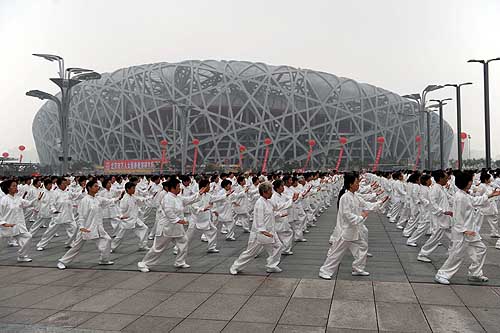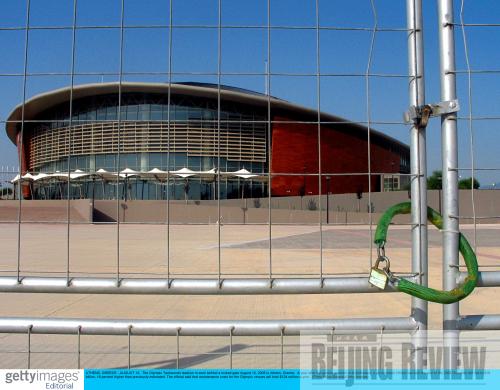|

In the very same way that Olympic athletes remain Olympians for the rest of their lives, Olympic cities are forever Olympic.
And, in the eyes of the world, the deeds of the thousands upon thousands of athletes, organizers, volunteers and citizens of Beijing a year ago will never be forgotten.
 |
|
GAME OVER: The gymnasium for Olympic Taekwondo competition is seen behind a locked gate on August 12, 2005, in Athens, Greece, a year after that city hosted the 2004 Games GETTY IMAGES |
The pace of change for most established nations is often slow, but the catalyst for change can sometimes seem to be instantaneous.
And so it was in many ways last year for Beijing.
 |
|
WAYNE HICKSON |
It was two weeks that forever shaped the future of the Olympic movement and put China's bustling, exciting and intriguing capital steadfastly in, and in many ways above, the company of the great cities of the world that have hosted the Summer Games.
Some 10,500 athletes from 204 countries took part in the 302 events on the program.
It was a grand gathering that saw 38 world records and 120 Olympic records set—an outstanding international success that took everyone's collective breath away.
Through these Games, the world learned more about China and China learned more about the world.
It was an Olympics punctuated by meticulous organization, a 4,000-year-old contemporary culture shared with the world and the unforgettable images of the permanently smiling faces of tens of thousands of blue shirted volunteers of all ages.
And while most of the billion-and-more people watching from all corners of the Earth will most readily remember the competition and the ceremonies—the excitement of the host nation's tally-winning 51 gold medals—one of the great legacies of any Olympic Games is what was physically built and what was left behind.
One only has to witness the awe with which all who stand before it take in the Bird's Nest.
The National Stadium stands as a monumental creation—an architectural puzzle and something to take the breath away of anyone fortunate enough to stand in its aura on the Olympic Green, sit in its stands or walk on its field of play.
Internationally it is the Olympic Stadium and the sprawling Olympic Green, against which, for many Olympiads to come, all others will be measured.
To mark the first anniversary of the Olympic opening ceremony on August 8, Inter Milan played Lazio in Italian soccer's Super Cup. It was the first event to be held at the venue since the Paralympics.
More top-level sport is planned as well, with the Bird's Nest fascinatingly set to host November's Race of Champions, which will feature Formula One drivers Michael Schumacher and Jenson Button, among others.
In its shadow sits the discotheque-inspired National Aquatics Center, or Water Cube—another head-scratching Chinese engineering marvel.
It's where U.S. superfish Michael Phelps on his record eight gold medals and where today Russian ballet dancers and synchronized swimmers entertain large crowds with a version of Swan Lake.
And amazing as both venues are, they are but two of the 31 Beijing-based structures that were designed and constructed through the sheer tenacity and creativity of the people of China.
New venues included the National Indoor Stadium, the Laoshan Velodrome, the Beijing Olympic Basketball Gymnasium, the Shunyi Olympic Rowing-Canoeing Park and over half a dozen more.
The upgrading of almost a dozen existing venues and the building of eight temporary sites such as the triathlon and road-cycling courses complemented these stunning new assets.
The IOC imprimatur
The high standard set by the Beijing venues was something not lost on International Olympic Committee President Jacques Rogge.
On a final inspection prior to the Games, Rogge said he was deeply impressed with the "beautiful" venues.
"They are the best I have ever seen," he said.
Only months later, at the press conference following the closing ceremony, he declared the venues "unprecedented."
Rogge said the venues and facilities would leave a rich legacy for the host city." These are sports venues that have been built and have been very intelligently embedded into the universities for the most part. And the after-the-Games use of the venues will be optimal," the president said.
"These venues will be used on a day-to-day basis by students, property owners, workers' unions. This is, I believe, a great legacy," he said.
The Long-term benefits
President Rogge's comments bring us to the long-term economic benefits of the Olympic legacy.
What many people possibly don't realize is that the Olympic venues of host cities past have, by their very existence, encouraged lucrative repeat sports tourism to those cities.
The Olympic cities have proven their ability to host major sporting and cultural events and they have shown they are capable of staging world and national championships, football competitions, aquatics, track and field and events of a similar caliber.
When the cauldron is extinguished and the athletes of the world head home, the infrastructure remains and that Olympic city becomes a magnet for other sports and cultural events of all kinds.
As Beijing organizing committee official Jiang Xiaoyu wrote in the state media recently, "Beijing has made some initial achievements in the proper use of sport venues to meet people's needs."
"The Olympic Green has become a new popular tourist spot. The number of visitors these venues drew exceeded even that of the Forbidden City for some time after the Games," Jiang said.
One needs look no further than the Chaoyang Park Stadium, where Olympic medals were decided in beach volleyball last August.
It is now the Sun Beach Theme Park, filled with families playing in the sand and taking in the unique atmosphere.
In October the $6-million China Open tennis tournament will be held for the first time at the Olympic venue while the Wukesong basketball arena, which is co-managed by the National Basketball Association (NBA), will host an international pre-season game between the Indiana Pacers and the Denver Nuggets.
Newer sports have also been attracted to Beijing, with the mixed martial artists of the Art of War circuit trading blows in the Olympic Sports Centre Gymnasium twice this year.
And let's not forget the "satellite" venues of Qingdao (sailing) and Hong Kong (equestrian) or those cities across the country that hosted preliminary rounds of the football competition; all are set to enjoy plenty of future sporting glory.
The Sydney experience
Sydney, the host of Australia's second Olympics in 2000, is a case in point.
In October 2009—nine years after their Olympic Games—the city and its immediate surrounding region will host the World Masters Games, where 28,000 mature athletes will compete in 28 sports at 72 venues over the course of two weeks.
The event offers a major tourism boost to Sydney and Australia and would certainly never have been possible if the city had not hosted the Games of the XXVII Olympiad.
It's sports tourism at its best—one of the most evolving and dynamic forms of tourism on the planet. It is something that Olympic cities can draw on as a continuing legacy of the investment in their venues.
| 